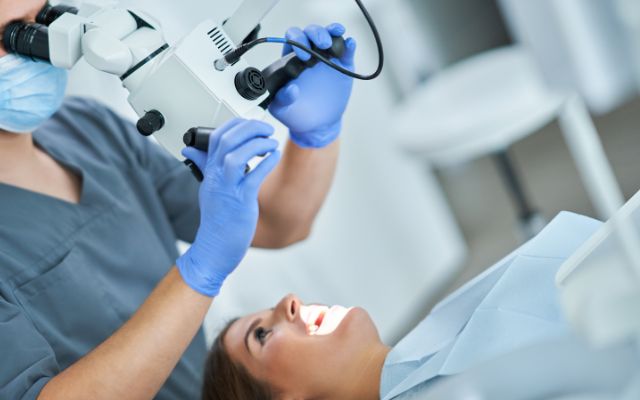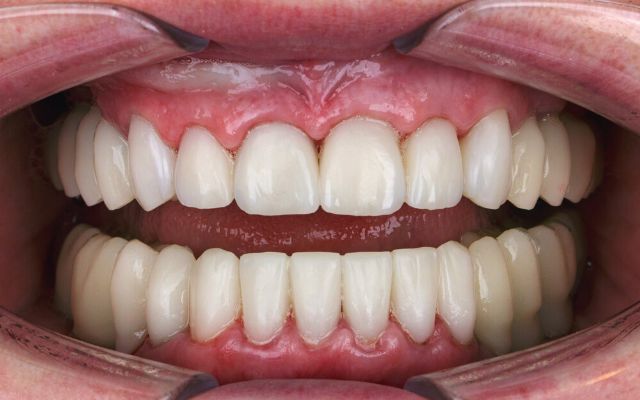Oral Surgery: Procedures, Types & Treatments In Bassendean
Oral surgery encompasses all surgical procedures performed on the teeth, gums, jaws, and other oral structures and consists of extractions, implants, gum grafts, and jaw operations. In this article, we will provide you with some information about the procedures, and type of Oral Surgery as well as some tips for treating it.
Let’s get started!


Overview of Oral surgery
Oral surgery encompasses a wide range of procedures performed on the teeth, gums, jaw, and surrounding oral and facial structures. Including tooth extractions, dental bone grafts, periodontal (gum) grafts, and corrective jaw surgery.
You may require oral surgery for a variety of reasons. Your dentist might recommend it if you have:
- Significant teeth decay.
- Poorly fractured teeth.
- Gum disease.
- Impacted enamel.
- Without teeth.
- Temporomandibular joint diseases (TMD).
- Loss of bone in the jaw.
- Sleep apnea.
- Oral cancer.
- Oral benign pathology (noncancerous lumps or bumps).


Some Types of Oral Surgery
Each year, numerous types of oral surgical treatments are performed. Tooth extraction, dental bone grafts, dental implants, periodontal surgery, corrective jaw surgery, sleep apnea surgery, and cleft lip and palate repair are among the most prevalent procedures.
Dental extraction
Tooth extractions are the most frequent type of oral surgery (tooth removal). If you have significant tooth decay, gum disease (periodontitis), dental trauma, or wisdom teeth issues, an extraction may be indicated. Sometimes, teeth are extracted to prepare the patient for dentures or other prosthetic devices.
Most dentists prefer to preserve natural teeth wherever feasible, but extractions are sometimes necessary to maintain your dental health. In addition, many dentists prescribe wisdom tooth extraction as a preventive strategy to lower the chance of developing cavities, bone loss, and other issues.
Dental bone graft
When bone loss has occurred in the jaw, a dental bone graft is required. There are a few potential causes for this. The roots of your natural teeth activate the nerves in your jaw when they are present. This prompts the brain to send nutrients to the jaw, maintaining it healthy and powerful.
Bone degeneration can occur in a location where a tooth has been absent for some time because there are no roots to stimulate the nerves. A dental bone graft restores volume and density to the jawbone in preparation for the placement of dental implants.
Occasionally, a bone transplant may be placed during periodontal surgery. Advanced gum disease can lead to bone loss around the teeth. A bone graft decreases movement and offers a stable foundation, preserving the health and vitality of your teeth.
Dental implants
Dental implants are typically regarded as the most dependable and durable alternative for replacing missing teeth. These tiny titanium or zirconia threaded posts are implanted into the jawbone to replace lost tooth roots. The implants can be repaired with dental crowns, dental bridges, or dentures once they have healed.
Periodontal surgery
If your periodontitis is mild or severe, a gum expert may offer gum disease therapy. During this process, incisions are created along the gum line, and the gum tissue is temporarily repositioned away from the teeth.
The dentist will then clean the roots of your teeth, clearing away the plaque and bacteria that have gathered under your gums. The gum tissue is then replaced and sutured into position.
Occasionally, periodontitis can result in gum recession. In such cases, you may require a gum graft. Donor tissue is used to strengthen the area of tissue loss during this operation. This tissue may be harvested from the palate or obtained from a recognized tissue bank.
Correctional dental surgery
Corrective jaw surgery, commonly known as orthognathic surgery, corrects irregularities of the jaw bones. This technique may be advised to enhance chewing performance, repair misalignment, or address facial asymmetry. Additionally, corrective jaw surgery is utilized to alleviate TMJ dysfunction-related pain (TMD).
Sleep apnea surgery
Obstructive sleep apnea (OSA) develops when the tissues at the back of the throat collapse and obstruct the airway during sleep. Occasionally, OSA is treated successfully with conservative approaches, such as oral appliance therapy or CPAP machine use. However, in severe cases, surgical intervention may be necessary.
When Might Oral Surgery Be Necessary?


Your crowded or crooked teeth might be straightened
If you wish to straighten your crowded and misaligned teeth, our dentist could suggest Invisalign therapy. With this procedure, you will wear a transparent aligner that will continuously and gradually move your teeth into the proper locations.
Brighten your teeth
Everyone enjoys having teeth that are brighter and whiter, in our opinion. With the help of our teeth-whitening operations, you won’t be ashamed to grin in public. Additionally, we have the choice of a take-home teeth-whitening procedure that makes use of specialized mouthpieces.
More evenly spaced as a result
Our dentists will evaluate the condition of your teeth and offer treatment by strengthening the existing tooth structure.
Veneers and other cosmetic dentistry operations might assist you in achieving a more even smile.
Give you more confidence
How much better you will feel about your appearance as a consequence of a smile makeover is one of the smile makeover’s most visible benefits. According to recent studies, many patients experience a significant boost in confidence following a smile makeover. Many of them have even found the joys of going on dates or out to supper with friends and family.
Make your oral health better
Improved overall health can be achieved through a smile makeover. A smile makeover’s primary purpose is to improve the appearance of your smile, but you may also experience some health benefits as a result of the procedure. For example, if you have a new dental restoration, it will be intended to optimize your bite and boost your chewing performance
How Should I Get Ready For Oral Surgery?


Prepare for oral surgery as you would for any important medical treatment, based on the type of surgery, and always follow your dentist’s instructions.
- Begin by ensuring that the area you’re returning to is clean and organized, so that you can be comfortable for at least two days, if necessary.
- Set arranges your bed such that you may, if necessary, sit on it.
- Follow the preoperative instructions given to you by your oral surgeon. In most cases, you will be instructed to abstain from eating and drinking 8 to 10 hours before surgery.
- If required, make arrangements for your return home. Discuss the type of anesthetic you’ll be receiving with your oral surgeon. Certain types of anesthesia may impair a person’s ability to drive. You may receive a topical or local anesthetic, depending on the sort of oral surgery you’re undergoing. If you are receiving IV anesthetic, you will need someone to drive you home.
3 Tips for Preparing for Oral Surgery


When you think of surgery, you usually envision a complicated operation for you and your medical team. Additionally, oral surgery may induce anxiety, especially if you’ve never had it before. However, oral surgery can be straightforward and painless if you are adequately prepared.
1. Be Informed
Tooth extraction is a typical reason for oral surgery. If you have wisdom teeth or tooth decay that cannot be treated with a root canal, you may be required to have a tooth extracted, and you will likely be sedated for your comfort.
Before your surgery, our dentists want you to feel comfortable. It is vital to us that you are well-informed, so please contact us if you have any questions regarding the following topics:
- Why you require dental surgery
- What potential threats does your procedure pose?
- What benefits will the surgical procedure provide?
- Before, during, and after the procedure, you must take certain measures.
- Your exhaustive treatment plans
- What occurs throughout the operation?
2. Carefully follow all pre-surgical instructions
Especially if you are having sedation as part of your oral surgery, the guidelines provided by our staff are essential. We can guarantee your comfort and minimize hazards associated with sedation thanks to the knowledge and technological advancements of modern dentistry.
You must abstain from all food and beverages for eight hours prior to your scheduled visit. If our staff instructs you to take any drugs before surgery, you may do so with a small amount of water.
Make sure you attend all scheduled appointments. Depending on your operation, we may need to take x-rays and create models of your mouth in order to perform your oral surgery successfully and promptly.
3. Arrive at your procedure prepared
Arrive at our office approximately 20 minutes before your planned appointment. This ensures you will have sufficient time to complete any further documentation and ask any additional questions before your procedure. Additionally, we want you to have time to unwind.
If you are undergoing sedation, you may wish to wear short sleeves so that we can obtain your vital signs, attach your IV, and monitor you more closely throughout operation.
Dangers and Side effects of Oral Surgery
As with any procedure, you should be aware of the possible risks and problems with oral surgery. These can consist of:
- Infection.
- Damage to surrounding teeth.
- Dry socket (a condition that can occur following extractions, when the blood clotting process is disturbed).
- Numbness.
- Fragments of tooth root
- Sinus issues.
You can reduce your risk for these issues by adhering to your post-operative instructions and taking all recommended medications. Call your healthcare practitioner if you experience any of these adverse effects for further instructions.
Contact Spring Orchid Dental
Our responsibilities as your dental health care provider do not end with surgery. Spring Orchid Dental and our staff are also concerned with your recuperation. We may offer pain medication and provide wound care advice.
If you received general anesthesia during your operation, you must arrange transportation home from our office. Additionally, you should plan to rest for the remainder of the day.
Some additional preparations will aid in your postoperative comfort. So that your tongue may recover, get some softer meals, and exercise self-care by relaxing and tending to your needs.
FAQs
When Should I See My Healthcare Provider?
Dental insurance typically only covers procedures that the insurance provider deems medically necessary. We’ll try our best to explain why your procedures are necessary because they’ll improve your oral health and guard against dental issues.
When Can I Return To My Job or School?
The majority of individuals can return to work or school in one to three days. It may take longer for more comprehensive surgeries, such as corrective jaw surgery.
Soft foods to consume following oral surgery
After oral surgery, avoid hard and crunchy meals to facilitate healing. Rather, stock your refrigerator and pantry with soft foods such as yogurt, soup, pasta, mashed potatoes, salmon, pudding, eggs, and rice. Try popsicles, ice cream, and milkshakes as a cold treat. Cold meals can assist in soothing the surgery site.
Is Oral Surgery Medical or Dental?
The majority of oral surgery falls under dental benefits when it comes to insurance. However, oral surgery is occasionally covered by medical insurance. For instance, if you’ve been in an accident and need oral surgery in a hospital, it’s likely that your health insurance will cover it.
However, plans and rules differ, so consult your healthcare provider for specifics. In brief, some oral surgical operations are covered by medical insurance, but not all.





